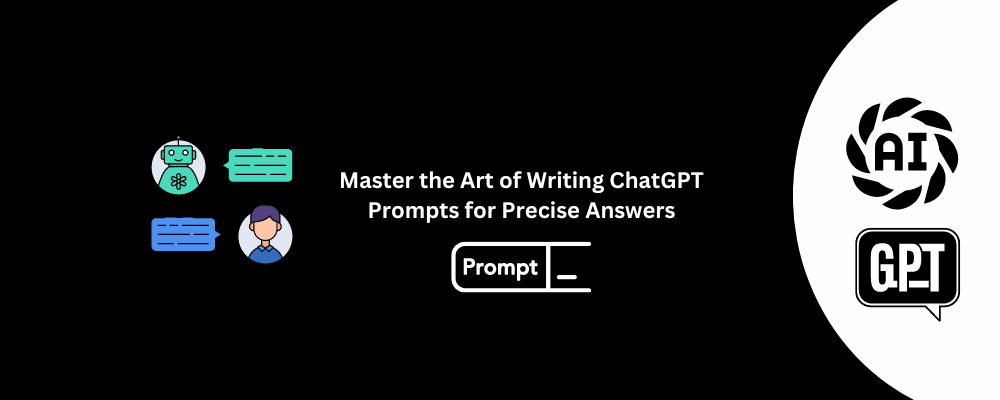Writing effective ChatGPT prompts is like setting the stage for an engaging conversation. You want to get the best possible response, but how do you do that? Writing the right prompts can significantly impact the quality of the answers you receive. Here, we will guide you through six ways to craft better ChatGPT prompts that deliver faster and more accurate results. Let’s dive in!
Understanding the Importance of Effective Prompts
When using ChatGPT, the questions you ask and how you ask them can determine the quality of the answers you get. Crafting prompts with clarity and context ensures you get valuable, relevant responses.
1. Start with Clear and Specific Instructions
A vague prompt can lead to unclear or broad responses. Always begin with specific instructions. For example:
- Instead of “Tell me about marketing,” ask “Explain three digital marketing strategies for small businesses.”
Clear prompts lead to concise and actionable answers.
How to Make Your Instructions Clear
- Use Direct Language: Be straightforward and avoid ambiguous terms.
- Define the Scope: Narrow down the topic to prevent generic responses.
- Include Context: Providing additional information helps ChatGPT focus.
2. Use Contextual Prompts for Enhanced Relevance
To get more relevant responses, embed context within your prompt. If you need advice about software, mention the platform, specific tools, or your particular use case.
Crafting Contextual Prompts
- Example Prompt: “What are the benefits of using Google Analytics for tracking e-commerce conversions?”
- Why It Works: It specifies the platform (Google Analytics) and the context (e-commerce conversions).
3. Ask Open-Ended Questions to Encourage Detailed Responses
Instead of yes/no questions, aim for open-ended questions. This approach encourages ChatGPT to provide richer, more detailed answers.
Examples of Open-Ended Prompts
- “How can small businesses effectively use content marketing?”
- “What are some innovative ways to improve customer engagement?”
4. Utilize Role-Playing Scenarios for Better Insight
Role-playing prompts can yield more nuanced and creative responses. This method works particularly well when seeking advice or exploring different perspectives.
Examples of Role-Playing Prompts
- “Imagine you are a startup founder. How would you approach your first year of marketing?”
- “As a project manager, how would you handle a team conflict?”
5. Break Down Complex Queries into Simple Questions
Complex prompts can overwhelm ChatGPT, leading to less effective responses. Break down complicated requests into simpler, more digestible questions.
Tips for Simplifying Your Prompts
- Segment Your Questions: Ask one thing at a time.
- Be Direct: Avoid nested questions to maintain clarity.
- Focus on One Aspect: Keep the prompt centered on a single topic.
6. Use Follow-Up Prompts to Refine the Answer
If the initial answer isn’t quite right, follow up with additional prompts. This approach helps fine-tune the response to better suit your needs.
How to Create Effective Follow-Up Prompts
- Initial Prompt: “What is SEO?”
- Follow-Up Prompt: “Can you explain on-page SEO tactics in detail?”
Conclusion
Writing better ChatGPT prompts is both an art and a science. By starting with clear and specific instructions, providing context, asking open-ended questions, utilizing role-playing scenarios, breaking down complex queries, and using follow-up prompts, you can significantly improve the quality of the responses you get. Follow these six strategies, and you’ll find ChatGPT more valuable and responsive than ever.
FAQs
Q1: How do I ensure my ChatGPT prompts are specific enough?
A: Use direct language and narrow down your query to a specific topic or angle.
Q2: Can I ask ChatGPT to role-play?
A: Yes, role-playing prompts can offer creative insights and different perspectives.
Q3: What should I do if I get a vague response?
A: Use follow-up prompts to refine and focus the answer.
Q4: Why are open-ended questions more effective?
A: They encourage detailed, thoughtful responses rather than simple yes/no answers.
Q5: How can I provide context in my prompts?
A: Mention specific tools, scenarios, or desired outcomes to add depth and relevance.
Exploring Grok 2: The AI Revolution That’s Changing Conversational Intelligence




